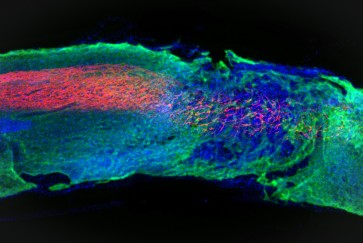EVANSTON - Northwestern University nanoscientist Chad A. Mirkin has been awarded the 2016 RUSNANOPRIZE for his invention of spherical nucleic acids (SNAs), tiny structures used around the globe for medical diagnostics, therapeutics and research purposes.

Chad A. Mirkin
Mirkin received the international nanotechnology prize, worth 3 million rubles ($48,000), at an award ceremony held today (Oct. 26) in Moscow.
An international award committee selected Mirkin as this year’s sole winner of the prize, recognizing his “SNAs and other medical, pharmacological and biotechnological materials and devices based upon them.” Also recognized is Nanosphere, a company co-founded by Mirkin, for successfully “applying the research into industrial production.” Nanosphere is now owned and operated by Luminex.
The RUSNANOPRIZE is awarded to “scientists and researchers being authors of scientific and/or technological discovery in the field of nanotechnology.” The prize focuses on a different area of nanotechnology each year; this year’s prize is for research conducted in the fields of medicine, pharmacology and biotechnology.
“This honor is important validation for what my research group and I have been trying to accomplish in the emerging area of nanomedicine and, more specifically, for the translation of our discoveries at Northwestern into commercial products,” Mirkin said.
Mirkin is the George B. Rathmann Professor of Chemistry in the Weinberg College of Arts and Sciences and director of Northwestern’s International Institute for Nanotechnology. He also is a professor of medicine at Northwestern University’s Feinberg School of Medicine and professor of chemical and biological engineering, biomedical engineering and materials science and engineering in the McCormick School of Engineering.
SNAs are structures composed of spherical nanoparticles densely covered with DNA or RNA — the genetic blueprints of living organisms. Similar to rays emitting from the sun, the DNA or RNA strands dangle from a common center; the resulting 3-D structure gives SNAs chemical and physical properties that are radically different from linear nucleic acids, the primary structure found in nature.
SNAs can naturally enter human cells and tissues while conventional forms of DNA and RNA cannot. SNAs are the basis for a pipeline of drugs designed to treat a wide variety of human diseases, including psoriasis, diabetic wounds and many forms of cancer.
RUSNANO established the RUSNANOPRIZE in 2009. RUSNANO implements state policy for the development of the nanoindustry in Russia, acting as a co-investor in nanotechnology projects that have substantial economic or social potential.

